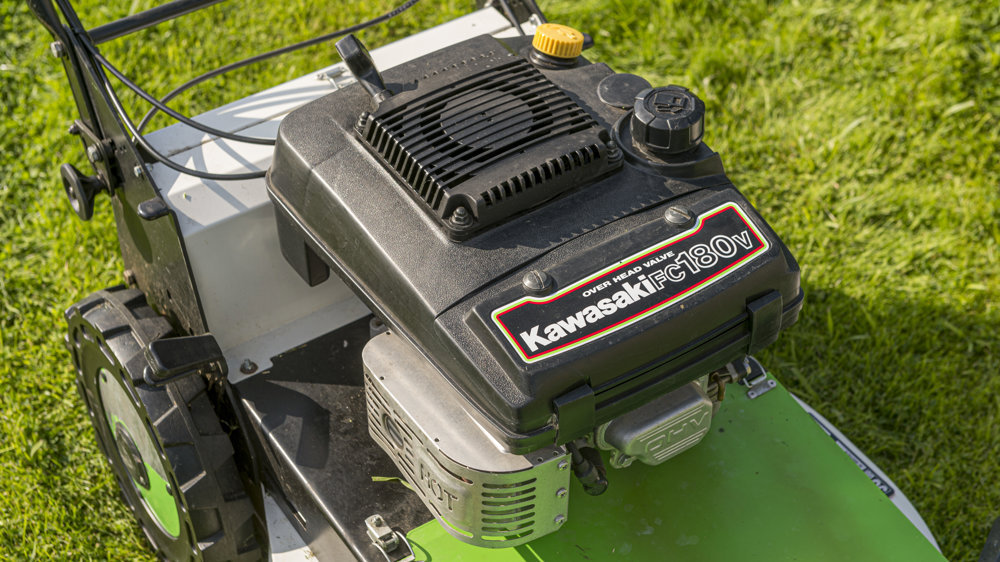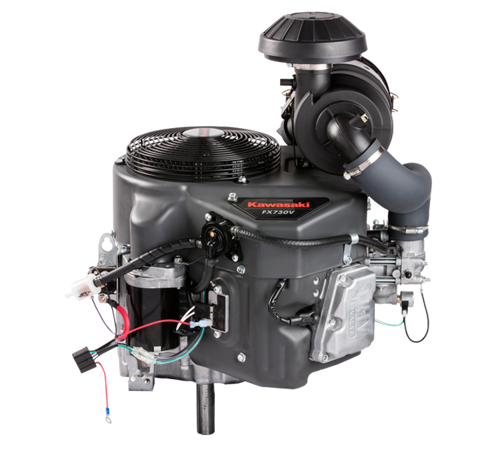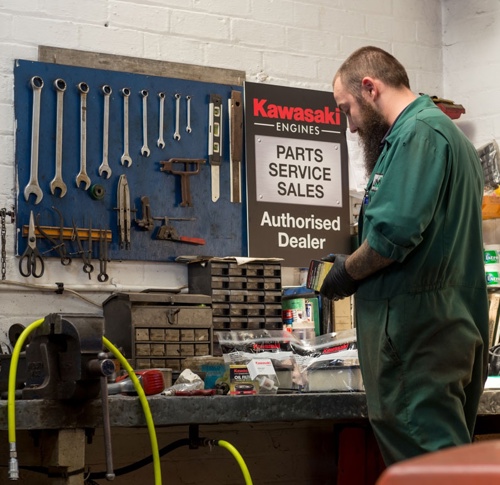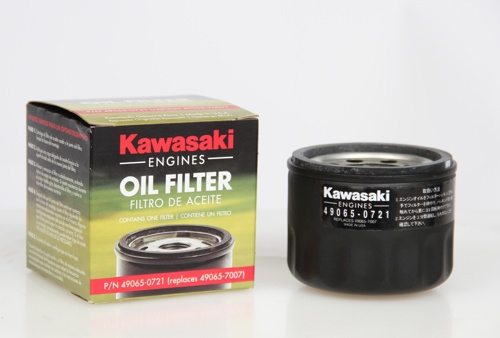How long do Kawasaki engines last?
23 Nov 2023 Engines & Aftercare
In the demanding world of professional landscaping, the reliability and longevity of your equipment are paramount. Extra repair costs, unnecessary downtime and, ultimately, a hit to your bottom line can all result from purchasing machinery that's not fit for professional-level work.
You want to know you’re making the right choice and investing in products that will perform reliably for many years – your livelihood depends on it. Kawasaki engines have powered countless ride-on and walk-behind mowers, brushcutters and other landscaping equipment since we first started manufacturing engines in 1957.
We’ve earned a reputation for reliability, but how does that translate into actual time spent working? How will a Kawasaki engine cope with the busy demands of your job?
Read on to find out how long you can expect a Kawasaki engine to last, what can impact this longevity and how you can extend its life.
How long does a Kawasaki engine last?
It’s a question we’re often asked – how long do Kawasaki engines last? The truth is that, while we take every step to make our engines as durable and robust as they possibly can be, part of this depends on you. It also depends on the engine model you select and the intensity of your workload.
Some of our engine models have extra durability features included, as they’re designed for heavier workloads. Our FX series from our V-Twin range, for example, has features like a heavy-duty starter, air filter and engine cover, while the TJ45E HD from our 2-stroke range features a heavy-duty clutch.

We regularly hear from people telling us they’ve had their Kawasaki engine for decades. What do they all have in common? We tend to find that they carefully looked after their machines and have stuck religiously to the correct maintenance schedule, as set out in their owner’s manual.
Our Parts & Technical Service team receive daily requests for service parts for engines that are decades old, many manufactured before our Genuine Parts Catalogue became digital. Though these engines are no longer in production, we are still committed to supporting those with older models, and will supply requested parts wherever possible. These requests come in every day – for our team, this is a fantastic endorsement that Kawasaki engines are built to last.
For a Kawasaki 4-stroke engine, your warranty will cover you for three years, with unlimited hours of use. For 2-stroke, two years with unlimited hours. But, of course, that doesn’t tell you how long your Kawasaki engine will last beyond that.
While we can’t definitively state how long a Kawasaki engine will last with so many variables, we have earned a reputation for reliability for a reason.
We investigated what landscaping professionals had to say on the topic.
When a similar question was posed on the Green Tractor Talk forum, these were the responses:
- If meticulously maintained you could get 2000-3000 hours out of a high quality air cooled engine like Kawasaki. Some folks have even gotten more.
- Average usage for me seems to be around 50 hours per year. That is regular mowing of 1 acre and using the tractor with a lawn cart for other misc. duties.
- Like others have said, if you maintain it, you can get 3000+ hours. Air cooled Kawasaki’s last a long time if you take care of them… …Everything else about the tractor will probably die before the engine does.
On the Lawnsite.com forum, the longevity of Kawasaki engines was again the point of discussion:
- I’ve got an old FB460V with about 4k and a 19hp KAI with 3800. Both run perfect, don’t smoke or leak a drop. I have several others with around 1500hrs with no probs. With proper care I would expect 2000hrs average.
- 1500-3000 is generally the range. Abused = shorter.
These are just a small handful of responses from other professionals, but we hope they give you a rough idea of what to expect from a Kawasaki engine. As is reiterated by the members of these forums, however, engine longevity is highly dependent on maintenance and care.
What can affect an engine's longevity?
As we’ve said, we can’t put an exact number of hours on how long an engine will last. What we can do is help you understand what impacts those hours.
There are several important factors that can significantly influence the engine life of a powerful Kawasaki engine. From meticulous maintenance routines to the impact of rigorous usage, it's good to know how these may affect your engine so that you can make sure that it continues to deliver dependable performance for as long as you need it to.
Maintenance – are you keeping to a schedule?
Proper maintenance of your machine is the cornerstone of extending the life expectancy of a Kawasaki engine, especially in the realm of professional landscaping. These engines are the workhorses of the industry, and their reliability is key for uninterrupted operation.
Regular maintenance routines should include:
-
Regular oil changes – to reduce friction and heat within the engine and prevent premature wear and tear.
-
Air filter replacements – to shield the engine from debris and contaminants that may infiltrate and damage major components.
-
Careful inspection of spark plugs – replacing spark plugs at recommended intervals ensures efficient combustion.
-
Valve adjustments – monitor and adjust valve clearance as per manufacturer's guidelines to ensure optimum efficiency and to avoid accelerated wear.
-
Clean cooling system – a clean and unobstructed cooling system is essential in preventing overheating and maintaining the optimal engine temperature.
This is just a handful of the maintenance tasks you need to perform to extend engine life. You should follow the maintenance schedule provided for your specific engine, and look to an Authorised Dealer to perform anything beyond the more basic tasks. Using official Kawasaki Engines Genuine Parts is another important factor, as you run the risk of inflicting unnecessary damage to your engine with non-genuine parts.

Ultimately, the cumulative effect of this meticulous maintenance regime is a Kawasaki engine that not only runs reliably but also boasts a considerably extended lifespan. By making sure the engine operates at peak efficiency, experiences minimal stress, and is shielded from external contaminants, professional landscapers can count on their equipment to deliver dependable performance over the long term.
Maintaining other machine components such as the mower deck and keeping blades sharp will also mitigate stress on your engine. This not only preserves your investment but also helps maintain productivity, so that your landscaping business thrives season after season.
Type of work – what conditions will your engine need to withstand?
Engines in landscaping equipment are designed to withstand a variety of environmental challenges, but the type of work you put your lawnmower through can play a pivotal role in determining the lifespan of your Kawasaki engine.
High humidity levels can lead to corrosion and rust, particularly if the equipment is not adequately stored or protected when not in use. Dust and debris from mowing operations can infiltrate the engine, causing friction, clogs, and increased wear on critical components. Moreover, the presence of abrasive particles in the air can accelerate the wear of engine parts over time.
Lawnmowers employed in areas with acidic or corrosive materials, such as fertilisers or pesticides, are especially susceptible to faster wear and potential damage.
Machine storage – are you storing your equipment correctly?

Engines left exposed to the elements quickly suffer from degradation, so it's important to keep your machines stored in an environment that's both clean and dry and can be covered when not in use.
A lawnmower or any landscaping machinery left outdoors, exposed to rain, snow, and extreme temperatures, is vulnerable to moisture ingress, rust and corrosion. These environmental stressors can cause severe damage to engine components.
It’s especially important to follow our guidelines for proper storage during the off-season. These storage practices make sure that your Kawasaki engine remains in prime condition, ready to perform reliably when the landscaping season resumes.
Neglecting proper storage for your lawnmower, on the other hand, can lead to costly repairs and shorten the engine's overall lifespan. Careful storage is therefore a vital aspect of engine care for professional landscapers, contributing significantly to both equipment longevity and operational efficiency.
Practical steps you can take to extend engine life
In the pursuit of extending the longevity of your valuable landscaping equipment, a few practical steps can make all the difference.
As discussed, regular maintenance is the undeniable key to extending engine life – these are a few extra considerations that may help.
Choosing the right fuel
To protect your landscaping equipment, the choice of fuel is vital. You should always refer to the Kawasaki owner's manual for your engine to guarantee you’re using the right fuel type. You can download your owner’s manual here.
When discussing fuel, it would be remiss to ignore the importance of draining it! If your equipment is to be stored for over 30 days, you should always remember to drain the fuel. Ethanol, which is now added to fuel to reduce CO2 emissions, can lead to corrosion if the engine isn’t being used.
You should also be cautious if you’re considering using fuel stabilisers to get you through the winter. There are many products available on the market that we have not tested and therefore cannot officially recommend for use. Adding stabilisers can affect engine performance, leading to issues like poor starting, rough running, smoking, misfiring, and poor economy. The best practice is to focus on a full fuel drainage for safe winter storage.
Following these simple measures can safeguard your engine from premature wear and keep it running smoothly.
Using Genuine Parts

To maximise your engine’s lifespan, you need to perform regular maintenance – but you also need to make sure that maintenance is of sufficient quality; both in terms of parts and the technicians performing the work. By choosing a Kawasaki Engines Authorised Dealer, you are sure to receive the highest quality of both.
Using official Kawasaki Genuine Parts means you’re getting the best parts for your engine, designed, tested and manufactured to our specifications. These parts are the same as those originally fitted in our factory, and designed with quality in mind; made to maintain performance and protect your engine.
Maintenance with aftermarket parts runs the risk of potentially causing catastrophic damage to your engine, but where the real difference often lies is in the engine’s longevity. The damage caused by parts that aren’t of guaranteed quality is often more subtle than outright engine failure – if you use aftermarket parts, gradual wear and tear caused by these replacements will likely shorten your engine’s lifespan. If you want a closer look at what separates Genuine Parts from aftermarket parts, try to spot the difference yourself.
Cold weather considerations
In colder climates, the proper warm-up of the engine is crucial for longevity. Allow the engine to idle for at least one to two minutes before engaging in more demanding tasks. Run gently until the engine reaches its optimal operating temperature. This practice prevents the engine from experiencing undue strain during cold starts, thereby extending its life.
Fuel tank maintenance
Monitoring your fuel tank and refilling it before it empties may seem obvious to a professional, but it’s worth mentioning as it can have a significant impact on engine longevity.
Keeping the tank topped up also helps keep any dirt away from the fuel filter, allowing the engine to ventilate better and run more smoothly. Moreover, it can prevent the risk of running out of fuel during critical landscaping tasks.
Kawasaki engines built for durability
A quality engine paired with a proper maintenance schedule is the key to extending engine life, allowing you to use your landscaping machines for many years at a professional level.
Strength and resilience are built into every Kawasaki engine. We use high-quality, robust components in our engines – for example, every one of our V-Twin engines has durable features like cast iron cylinder liners and heavy-duty oil pumps – to make them as resilient and reliable as possible. Heavy-duty, carefully designed parts and intensive testing are essential to our engines, to guarantee a professional-level performance and dependability.
Our engines are designed with the professional in mind, and we work with like-minded manufacturers to create the best equipment in the industry. Explore our Powered by Kawasaki range to find machinery that can reliably perform for years to come.
You may be interested in
-
A match made in heaven: how do we pair Kawasaki engines with the machines they power?

-
How do we guarantee quality at Kawasaki Engines? A behind-the-scenes look into our US manufacturing plants

-
4-stroke engine maintenance: a how-to guide

-
Kawasaki Engines genuine parts and non-genuine aftermarket parts: what’s the difference?

-
Spot the difference: a side-by-side comparison of genuine and aftermarket parts.

-
Winter pre-storage preparation for your Kawasaki powered equipment







